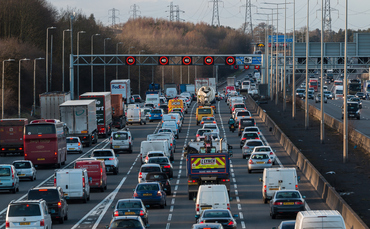A new research center will lead efforts to leverage the use of digital twin technologies to optimize efforts to decarbonize connected transport systems.
The TransiT Hub, led by Heriot-Watt University in Edinburgh and the University of Glasgow, today unveiled new plans to develop a range of digital twins – digital replicas of the physical world that can collect data in real time using sensors connected to infrastructure such as roads, railways or shipping – to quickly model different approaches to reducing emissions.
The project has received support from a £46 million investment from the UKRI Engineering and Physical Sciences Research Council (EPSRC) and now boasts 67 partners, including many leading companies such as Airbus, Amazon Web Services, John Lewis, Network Rail, Rolls Royce, Stagecoach, Tesco and others.
The initiative will also bring together eight universities, with each institution focusing on a different research area.
For example, Heriot-Watt will use digital twins to study how to decarbonise logistics and freight, and the University of Glasgow will work on digital twins and cyber-physical systems. Meanwhile, the University of Leeds will look at developing policy to decarbonise transport, the University of Birmingham will assess the decarbonisation of rail, and Cranfield University will look at how to reduce emissions from aviation.
Other universities involved in the programme include University College London, the University of Cambridge and Durham University, which will focus on maritime transport, road freight transport and public transport systems respectively.
Professor Charlotte Deane, executive chair of the EPSRC, said digital twins offer “a huge opportunity to decarbonise our transport networks by testing the potential impacts of change more quickly, reducing costs and helping us design the transport networks we need, when we need them”.
“Passengers and commuters will benefit from being able to choose the most sustainable travel options, while transport operators can accelerate their work to deliver low-carbon services,” she said. “TransiT is the result of significant collaboration between UKRI and the government to explore how we can best leverage the expertise of a wide range of partners from academia, industry and other organisations to ensure we seize the opportunities presented by digital twins.”
Digital twins allow companies and policymakers to quickly model the impact of changes to a transport system and quickly calculate the likely impacts on emissions, congestion and the public. The approach can even be used in real time, for example to update digital road signs with information on the optimal speed or shortest route out of congestion, and for long-term planning of new low-carbon transport systems such as charging networks for electric vehicles.
Personalized digital twin assistants, which function similarly to your streaming platforms that learn an audience’s preferences, could also be used to calculate optimal rides and charging plans for individuals.
The collaboration is believed to be one of the largest transport consortia of its kind in the UK and the centre will also work with passenger groups to enable transport users to help researchers model human travel behaviour and decisions.
“Transport accounts for around a third of the UK’s carbon emissions and, with global temperatures rapidly rising, we no longer have time to run real-world transport trials and learn from them,” said Professor Phil Greening of Heriot-Watt University, co-director of TransiT. “So if the UK is to meet its carbon reduction commitments, we need to run our experiments digitally. We need to design the future transport system and optimise the transition to it.”
“Digital twins will help us understand where, what and how we can decarbonize transport. We’re starting by building individual models of real transport systems. These can then be connected and linked to the real world to get a more comprehensive picture of what our future decarbonized transport system could look like – and how we can achieve this goal in the most cost-effective way.”
Welcoming the opening of the new hub, Feryal Clark, Minister for AI and Digital Government, said: “We see a technological future for Britons that enriches and improves their lives. The research TransiT will now undertake is a prime example of how we are supporting groundbreaking innovation to make this vision a reality.”
“Not only does this project save citizens time and money on their daily journeys, it also harnesses the power of transformative digital technologies to reduce carbon emissions, demonstrating the incredible impact technology can have on improving our public services, tackling climate change and much more.”
You can now register to attend the fifth annual Net Zero Festival, hosted by BusinessGreen at the Business Design Centre in London on 22 and 23 October.

